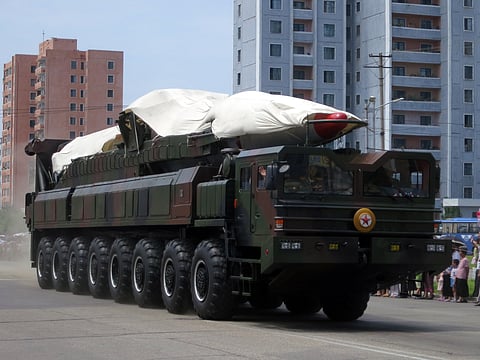

North Korea conducted test launches of two new missiles on Saturday as joint U.S.-South Korea military drills continued on the Korean Peninsula, exercises that Pyongyang has long condemned as “destabilizing” and provocative.
According to the Korean Central News Agency (KCNA), North Korean leader Kim Jong Un personally oversaw the launch. While the state outlet did not release full specifications, it described the weapons as “improved” surface-to-air missiles designed to counter various aerial threats with rapid-response capabilities. KCNA also claimed the systems incorporate “unique and special technology,” but did not disclose details such as range, guidance systems, or the missile’s designation.
Analysts view the test as part of Pyongyang’s ongoing effort to strengthen its air defense network, likely drawing lessons from recent conflicts where drones and missile strikes have played a decisive role, including the war in Ukraine. Some experts have speculated on potential Russian technical assistance, citing growing military cooperation between Pyongyang and Moscow following the deployment of North Korean troops to the Kursk region last year during Ukraine’s cross-border offensive.
The launch coincided with the annual Ulchi Freedom Shield exercises, which began Monday and will continue through Thursday. North Korean officials have labeled the drills “hostile and confrontational,” with Kim Jong Un warning they could “ignite a war.” Lieutenant General Ko Jong Chol echoed similar concerns, accusing Washington and Seoul of escalating tensions on the peninsula.
The tests also followed a recent incident on August 19, when around 30 North Korean soldiers briefly crossed the Military Demarcation Line in the Demilitarized Zone, prompting warning shots from South Korean forces.
Amid these tensions, U.S. President Donald Trump is set to meet South Korean President Lee Jae-myung in Washington, D.C., on Monday. Lee, who has taken a relatively softer approach toward Pyongyang, recently removed propaganda loudspeakers along the DMZ in an effort to reopen dialogue, though it remains unclear if North Korea will reciprocate. Earlier this year, reports indicated Trump sent a letter to Kim Jong Un via U.S. diplomats at the United Nations, but the North Korean delegation reportedly declined to accept it.